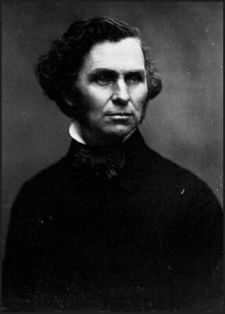
Portland Rum Riot
Encyclopedia

Portland, Maine
Portland is the largest city in Maine and is the county seat of Cumberland County. The 2010 city population was 66,194, growing 3 percent since the census of 2000...
on June 2, 1855 in response to the Maine law
Maine law
The Maine law, passed in 1851 in Maine, was one of the first statutory implementations of the developing temperance movement in the United States.-History:Temperance activist Neal Dow helped craft this law...
which prohibited the sale and manufacture of alcohol
Alcohol
In chemistry, an alcohol is an organic compound in which the hydroxy functional group is bound to a carbon atom. In particular, this carbon center should be saturated, having single bonds to three other atoms....
in the state the year before.
History
The Maine lawMaine law
The Maine law, passed in 1851 in Maine, was one of the first statutory implementations of the developing temperance movement in the United States.-History:Temperance activist Neal Dow helped craft this law...
of 1851 outlawed the manufacture and sale of alcohol in the state of Maine, except for medicinal and mechanical purposes. Rumors began to spread that Portland Mayor Neal S. Dow
Neal S. Dow
Neal S. Dow , nicknamed the "Napoleon of Temperance" and the "Father of Prohibition", was mayor of Portland, Maine. He sponsored the "Maine law of 1851", which prohibited the manufacture and sale of liquor...
, (1804–1897), an outspoken prohibition
Prohibition
Prohibition of alcohol, often referred to simply as prohibition, is the practice of prohibiting the manufacture, transportation, import, export, sale, and consumption of alcohol and alcoholic beverages. The term can also apply to the periods in the histories of the countries during which the...
ist also known as the "Napoleon of Temperance", was keeping a large supply of alcohol in the city. Dow had authorized a shipment of $1,600 worth of "medicinal and mechanical alcohol" that was being stored in the city for distribution to pharmacists and doctors
Physician
A physician is a health care provider who practices the profession of medicine, which is concerned with promoting, maintaining or restoring human health through the study, diagnosis, and treatment of disease, injury and other physical and mental impairments...
(as was authorized under the Maine law) but this detail was not widely reported. To further complicate matters, Dow and the city alderman began a vocal battle over the shipment because they had not authorized the expenditure.
Portland’s large Irish immigrant population were particularly vocal critics of the Maine Law, seeing it as thinly veiled racist attack on their culture. They already disliked and distrusted Dow and this incident made him appear to be a hypocrite. The Maine law that Dow had sponsored had a mechanism whereby any three voters could apply for a search warrant if they suspected someone was selling liquor illegally. Three men did appear before a judge, who was compelled to issue a search warrant.
On the afternoon of June 2, a crowd began to gather outside the building where the spirits were being held. The crowd numbered about 200 by 5:00 p.m. and grew larger and more agitated as the day progressed. Separate contemporary accounts place the crowd's size between 1,000 and 3,000 by evening. As the crowd became larger, rock throwing and shoving began.
Police were unable to deal with the growing mob and Dow called out the militia
Militia
The term militia is commonly used today to refer to a military force composed of ordinary citizens to provide defense, emergency law enforcement, or paramilitary service, in times of emergency without being paid a regular salary or committed to a fixed term of service. It is a polyseme with...
. The exact details of the climax of the riot have been hotly debated. What is known is that after ordering the protesters to disperse, the militia detachment fired into the crowd on Dow's orders. One man, John Robbins, an immigrant and mate of a Maine sailing vessel from Deer Isle
Deer Isle, Maine
Deer Isle is a town in Hancock County, Maine, United States. The population was 1,876 at the 2000 census. Notable landmarks in Deer Isle are the Haystack Mountain School of Crafts and the town's many art galleries.-History:...
, was killed and seven others were wounded.
The crowd was dispersed but Dow was widely criticized for his heavy handed tactics during the incident.
In a twist of irony, Dow was later prosecuted for violation of the Maine Law for improperly acquiring the alcohol. The prosecutor was former U.S. Attorney General Nathan Clifford
Nathan Clifford
Nathan Clifford was an American statesman, diplomat and jurist.Clifford was born of old Yankee stock in Rumney, New Hampshire, to farmers, the only son of seven children He attended the public schools of that town, then the Haverhill Academy in New...
and the defense attorney was later U.S. Senator and Secretary of the Treasury William P. Fessenden
William P. Fessenden
William Pitt Fessenden was an American politician from the U.S. state of Maine.Fessenden was a Whig and member of the Fessenden political family...
. Dow was acquitted, but the event was a major contributing factor to the repeal of the Maine law in 1856.

